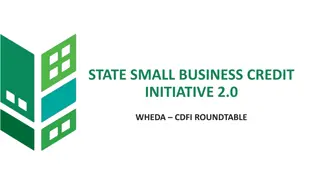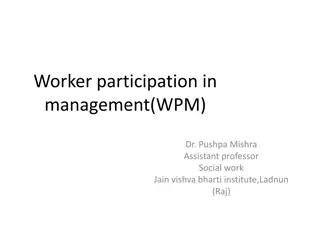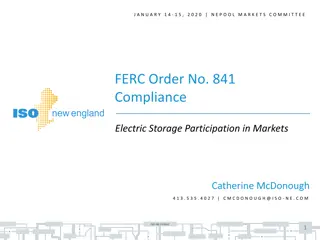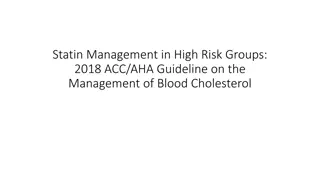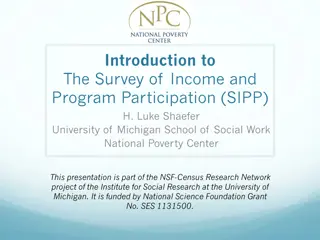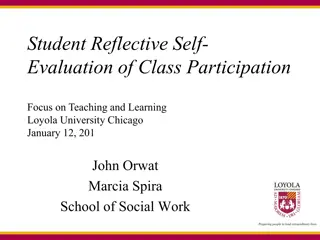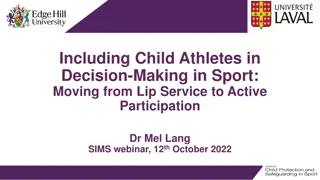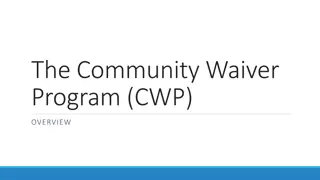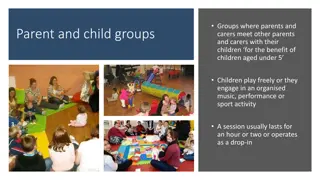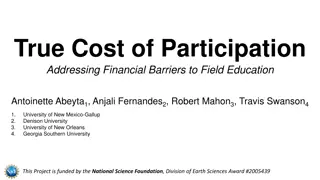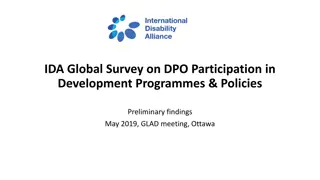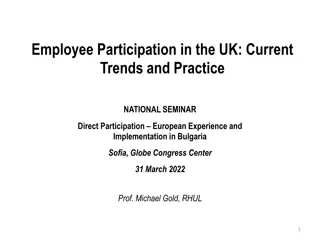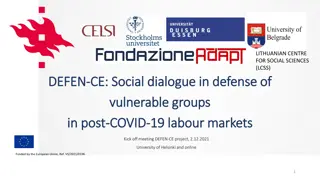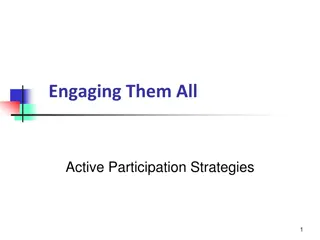Types of groups and reactions
This information discusses electron-donating groups (EDGs) and electron-withdrawing groups (EWGs), their effects on molecule reactivity, examples of each group, nucleophiles, and electrophiles. EDGs increase electron density, making nucleophiles stronger, while EWGs decrease electron density, making
0 views • 14 slides
WHEDA State Small Business Credit Initiative 2.0 Overview
WHEDA, the Wisconsin Housing and Economic Development Authority, collaborates with various entities to provide low-cost financing programs aimed at stimulating the state's economy. Through initiatives like the Loan Participation Program (LPP), Collateral Support Program (CSP), and Capital Access Pro
1 views • 17 slides
Understanding Participation Requests in Community Development
Participation Requests offer community groups the opportunity to have a greater say in decisions and services that impact their community. They enable people to engage, voice their opinions, influence policy development, and seek alternatives for better outcomes. These requests are outcome-focused a
3 views • 10 slides
Class Groups Are They the Future of Collaborative Learning
The traditional classroom setting, with rows of students facing a teacher at the front, has dominated education for centuries. However, the rise of technology and the evolving needs of the 21st century workforce are pushing the boundaries of learning. Enter Class Groups, a concept that reimagines th
4 views • 3 slides
Understanding Functional Groups in Organic Chemistry
Functional groups in organic chemistry are specific groups of atoms within molecules that determine the chemical properties of the compound. This content provides visual representations and descriptions of various functional groups such as alkanes, alkenes, alcohols, aldehydes, acids, and esters. Le
0 views • 38 slides
Understanding Worker Participation in Management for Enhanced Organizational Effectiveness
Worker Participation in Management (WPM) involves workers in decision-making processes, leading to increased understanding, productivity, commitment, and the opportunity for self-expression. Dr. Pushpa Mishra, an Assistant Professor at Jain Vishva Bharati Institute, Ladnun, explains the concepts, fe
0 views • 7 slides
Revised Approach for Distributed Energy Resource Aggregations in Wholesale Markets
Revised market design approach to comply with Order No. 2222 requires ISOs/RTOs to allow distributed energy resources to provide wholesale services. The focus is on areas like Energy and Ancillary Services Markets Participation, Metering and Telemetry Requirements, DERA Registration Coordination, an
0 views • 103 slides
FERC Order No. 841 Compliance Details for Electric Storage Participation in Markets
The content discusses FERC Order No. 841 compliance requirements for electric storage resources in RTO/ISO markets. It covers the additional compliance requirements, such as metering rules, retail service provision, transmission charges, and market participation rules. ISO New England's proposed res
0 views • 15 slides
Participation of Distributed Energy Resource Aggregations in Wholesale Markets: Compliance with Order No. 2222
The presentation outlines the high-level market design approach by ISO New England to comply with Order No. 2222, allowing distributed energy resources to provide wholesale services. It covers compliance directives, participation models, metering requirements, registration coordination, operational
0 views • 77 slides
Gender-Responsive Fiscal Policies and Female Labor Force Participation
Despite persistent gender gaps in labor force participation and wages, various fiscal policy measures have been adopted globally since the mid-1980s to address these disparities. Understanding the impact of gender-responsive fiscal policies on female labor force participation, economic growth, incom
0 views • 23 slides
Guideline for Statin Management in High-Risk Groups - 2018 ACC/AHA
This guideline outlines the management of blood cholesterol in high-risk groups according to the 2018 ACC/AHA recommendations. It discusses the overall approach, different statin management groups, justification for statin use in high-risk populations, high and moderate-intensity statin therapy, and
1 views • 14 slides
GCSE Physical Education Revision Guide
This GCSE revision guide covers key topics in Physical Education, focusing on engagement patterns, factors influencing participation, strategies for promoting participation, and the impact of commercialisation on sport. It explores current trends in physical activity, considerations for different so
0 views • 20 slides
Understanding Interest Groups in Texas
Explore the role and influence of interest groups in Texas politics, including theories, types of groups, activities, and the impact of lobbying. Learn about incentives for joining, the free rider problem, and the various benefits interest groups offer. Discover the different types of interest group
0 views • 15 slides
Introduction to the Survey of Income and Program Participation (SIPP)
The Survey of Income and Program Participation (SIPP) is a nationally representative, longitudinal survey providing data on income dynamics, government program participation, and social contexts of U.S. households. The SIPP aims to evaluate annual and sub-annual changes in income, program participat
0 views • 27 slides
Understanding the Role of Interest Groups in Politics
Interest groups are organizations with shared policy goals that influence the policy process. They differ from political parties as they focus on specific policies. Theories of interest group politics include pluralist, elite, and hyperpluralist perspectives. Hyperpluralism suggests that groups beco
0 views • 22 slides
Enhancing Fiscal Policy Planning through Public Participation and Transparency
Explore the importance of public participation and meaningful transparency in fiscal policy planning and public expenditure management. Learn about the GIFT Network, its champions and stewards, and how fiscal transparency and public participation can lead to improved fiscal and development outcomes
0 views • 22 slides
Understanding Chemical Groups and Macromolecules in Biological Processes
In biological processes, certain chemical groups play crucial roles in molecular functions. These functional groups, including hydroxyl, carbonyl, carboxyl, amino, sulfhydryl, phosphate, and methyl, are essential for the structure and function of biological molecules. Additionally, macromolecules, s
0 views • 9 slides
Understanding Public Opinion and Political Participation
Public opinion and political participation are influenced by various factors such as financial interests, family, education, and party identification. Measuring public opinion accurately through scientific surveys is crucial in a democracy. Traditional participation methods like voting and civic vol
5 views • 7 slides
Enhancing Student Participation in Academic Development
Class participation plays a crucial role in improving critical thinking, active learning, and professional development. However, incentivizing and grading student participation pose challenges such as unclear criteria and individual differences. Strategies to enhance student involvement include moti
0 views • 29 slides
Empowering Child Athletes: Enhancing Participation in Sports
Empower child athletes by actively involving them in decision-making processes within sports, transitioning from mere lip service to meaningful engagement. Dr. Mel Lang leads a webinar discussing the importance of youth participation, benefits, challenges, and initiatives for building a culture that
0 views • 26 slides
Overview of the Community Waiver Program (CWP) and Enrollment Groups
The Community Waiver Program (CWP) aims to support full participation in communities, preserve natural living arrangements, and reduce waiting lists by offering targeted services to different enrollment groups. The program includes three authorities: 1915(c) Waiver, 1915(i) State Plan Amendment, and
0 views • 58 slides
Guidelines for Parent and Child Groups Under 5 Years Old
Parent and child groups for children under 5 provide a space for families to connect while children play freely or participate in structured activities. Sessions last for an hour or two with a maximum of 30 attendees. Indoor singing is limited to 6 adults, with good ventilation, while outdoor singin
2 views • 5 slides
Representation of Abstract Groups through Graphs
Explore the representation of abstract groups as automorphism groups of graphs, touching on topics such as the existence of graphs whose automorphism groups are isomorphic to given abstract groups, the cardinality of connected graphs satisfying specific properties, and questions regarding the cardin
0 views • 16 slides
Addressing Financial Barriers to Field Education: True Cost of Participation
Exploring the financial barriers hindering participation in field education, this project delves into the costs associated with field work trips and the impact on student involvement. Lack of adequate gear, safety hazards, and quality of trips are highlighted as potential barriers. The study aims to
0 views • 15 slides
Practical Approach to Using Groups and Teams in Classroom Settings
This workshop focuses on utilizing groups and teams in educational environments, providing techniques to form diverse and effective groups, outlining key principles, exploring low and high-risk activities, discussing different forms of peer assessment, and addressing challenges associated with group
0 views • 27 slides
Insights into Labour and Birth Among Marginalized Groups and Migrant Women
This content discusses new insights into socio-cultural phenomena surrounding labour and birth, particularly focusing on marginalized groups and migrant women. It includes details on sub-working groups, updates, and plans within this topic area, such as experiences of labour and birth, optimizing ch
0 views • 22 slides
Understanding Organic Chemistry: Functional Groups and Naming Rules
Delve into the world of organic chemistry with a focus on functional groups like alcohols, ethers, aldehydes, and ketones. Explore the rules for naming these compounds, understanding their structures, and how they impact the properties of molecules. From alcohols with hydroxy groups to ketones conta
0 views • 21 slides
Global Survey on DPO Participation in Development Programmes & Policies
The IDA Global Survey gathers preliminary findings on the participation of persons with disabilities in development programs and policies, emphasizing the importance of meaningful engagement and representation through DPOs. The survey aims to monitor the reality of DPO involvement, consultation, and
0 views • 13 slides
Gender Disparities in Sports Participation and Preferences
The data presented reflects gender differences in sports participation and preferences over time. It shows that more males than females like to watch and take part in sports, with younger women showing more interest compared to older women. While all men interviewed have played sports, most women ha
0 views • 14 slides
Understanding Pressure Groups and Their Influence on Decision-Making
Pressure groups are formed by like-minded individuals to influence decision-makers by drawing attention to specific issues, with the aim of impacting legislation and existing laws. People join pressure groups seeking to address particular issues more effectively than through mainstream politics. Whi
0 views • 25 slides
Measuring Student Participation in Higher Education in South Africa
This paper discusses the measurement of student participation in higher education in South Africa, focusing on enrollment rates, demographic distributions, and age groups from 2001 to 2007. It highlights the government's role in steering quality planning and funding in the public higher education sy
0 views • 24 slides
Hierarchy of Housing Board and Covid-19 Response Groups
Focus on Covid-19 response with various groups established for coordination. Housing Board utilizes existing networks for input and feedback, encourages collaborative efforts among partners, and engages in consultations and projects. Addresses issues related to rough sleepers, vulnerable groups, and
0 views • 12 slides
Influence of Group and Culture on Human Personality Development
Society functions as a cohesive unit composed of smaller social groups that interact and shape individuals' psycho-social development. The difference between mechanical aggregates and psycho-social units lies in the emotional connections and responsibilities present in the latter. Groups like family
0 views • 8 slides
Enhancing Public Participation in Fiscal Policy and Budget Processes in PEMPAL Countries
This document discusses the progress and next steps in mainstreaming public participation in fiscal policy and budget processes in PEMPAL countries. It covers definitions of public participation and budget literacy, outlines international frameworks, presents survey findings on public participation,
0 views • 35 slides
Employee Participation Trends and Challenges in the UK
This presentation delves into the significance of employee participation and involvement (EPI) in the UK, discussing its operation, trends, challenges in precarious labor markets and the gig economy. It highlights the benefits of involving employees in decision-making processes, such as protecting w
0 views • 23 slides
Enhancing Public Participation in Fiscal Policy Design and Implementation
Public participation in fiscal policy processes is essential for improving resource allocation, targeting policies to meet citizens' needs, empowering citizens, broadening dialogue, reducing corruption, enhancing service delivery, reforming state agencies, and increasing government legitimacy. This
0 views • 17 slides
Social Dialogue in Defense of Vulnerable Groups in Post-COVID-19 Labour Markets
The Lithuanian Centre for Social Sciences (LCSS) is hosting the DEFEN-CE project kickoff meeting at the University of Helsinki, focusing on social dialogue in defense of vulnerable groups in post-COVID-19 labor markets. The project aims to explore the role of social dialogue in addressing employment
0 views • 33 slides
Enhancing Active Participation Strategies for Student Engagement
Engaging Them All Active Participation Strategies by Anita L. Archer, Ph.D., focuses on the importance of eliciting frequent responses from students to create a positive learning environment, increase engagement and accountability, and promote desired behaviors. The resource emphasizes the benefits
0 views • 72 slides
Decode the Food Groups Challenge
Test your knowledge of food groups by decoding the names of different food groups based on hints provided for each. Identify the food groups where nutritious foods like oatmeal, mango, yogurt, soy milk, nuts, and spinach belong. Challenge yourself to decipher the encoded words and improve your under
0 views • 5 slides
Student Interest Group Policy Changes Overview
Student Interest Group Policy Changes involve implementing new criteria for student interest groups, setting membership requirements for preclinical and clinical years, consolidating existing groups, and establishing new interest groups. The policy includes guidelines on events, fundraisers, faculty
0 views • 9 slides

